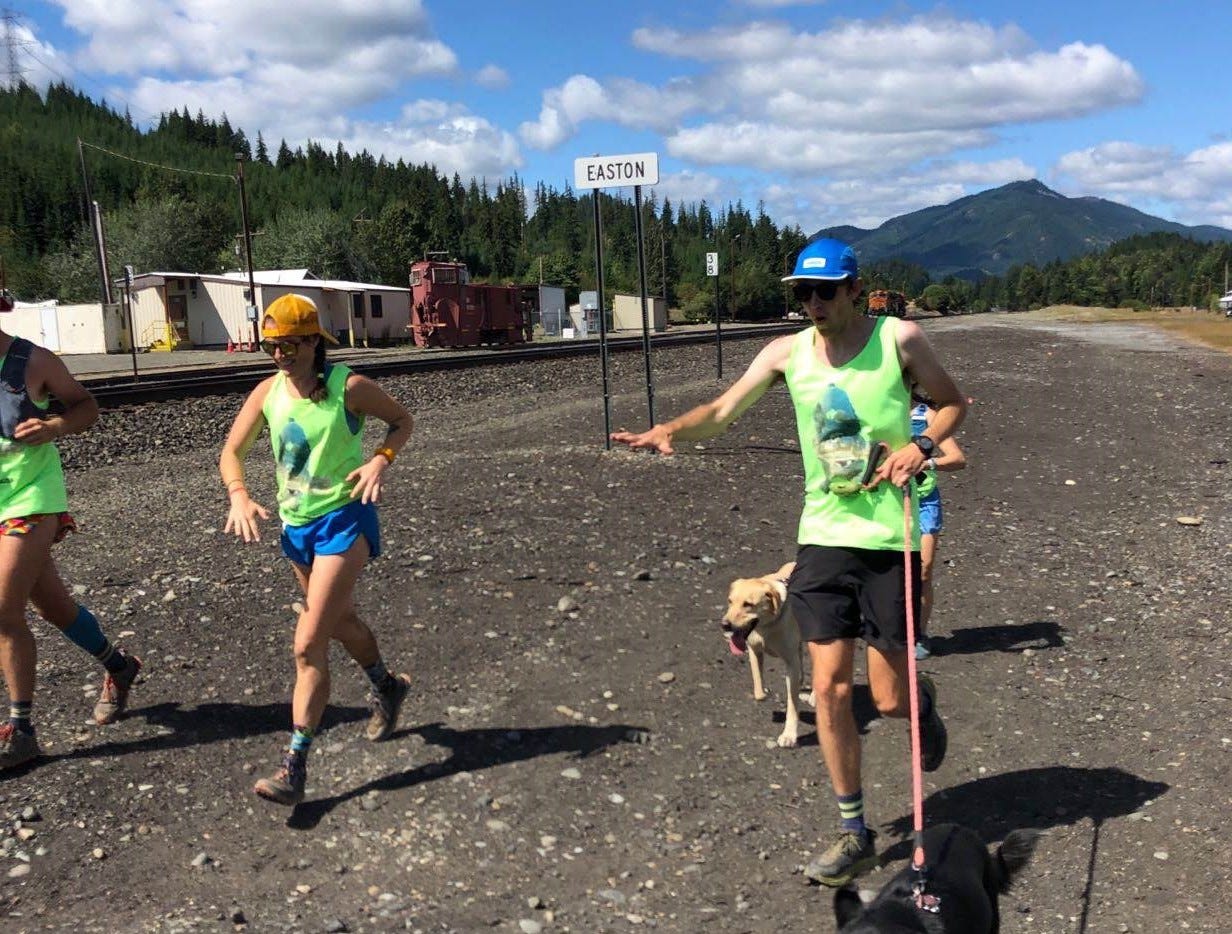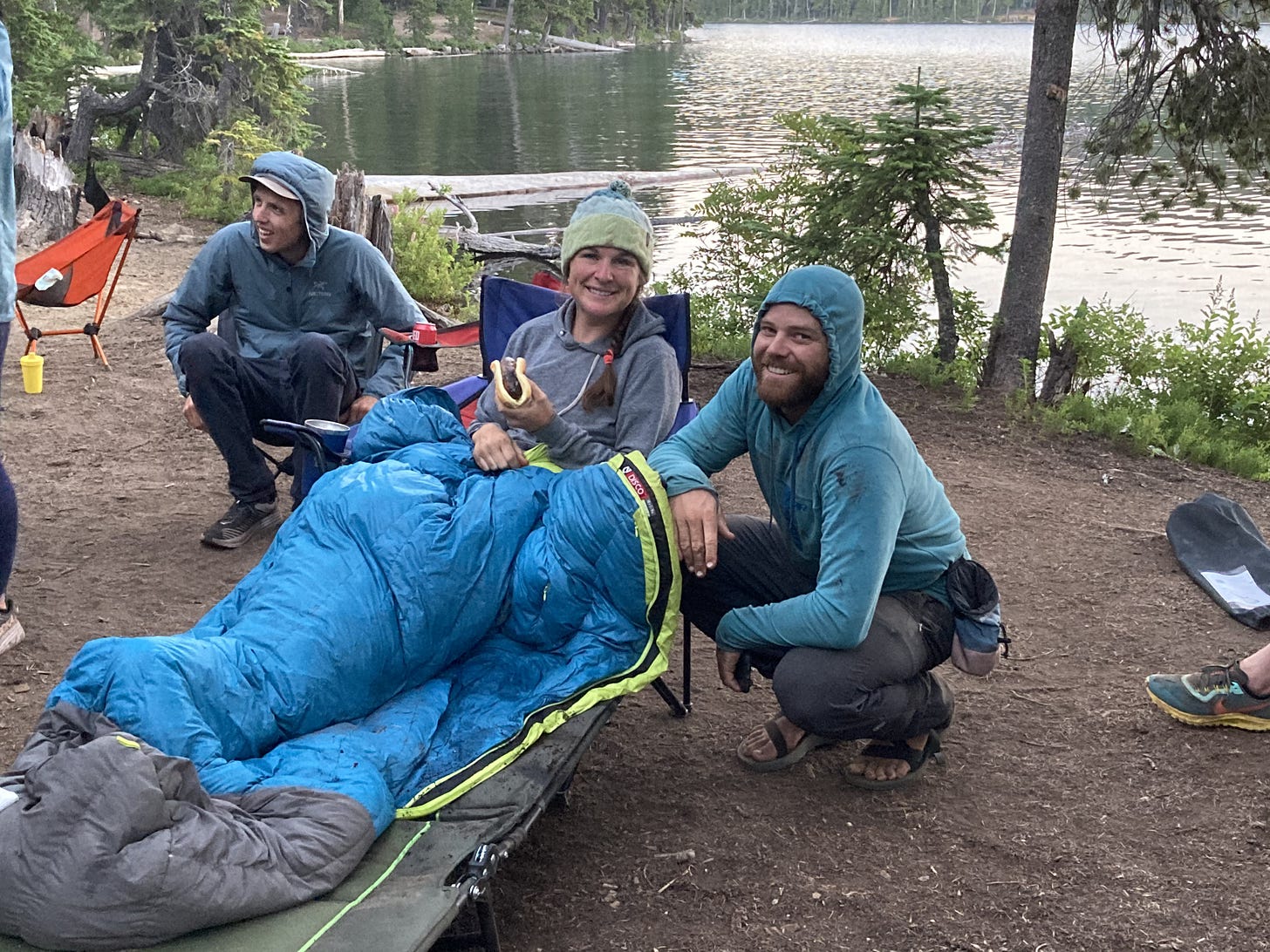When I hit mile 96 of the Cascade Crest 100 a couple of summers ago, I felt like I was cruising through the final stretch of the race, despite how wrecked my body was. My legs were beyond pummeled from moving over mountains for over 24 hours, but they kept striding forward with the spirit of a cheetah chasing its first prey of the day.
All five of my crew members jumped in with me at that last aid station and they blared Taylor Swift and Lizzo as we ran. We hooted and hollered and belted out fast-paced lyrics as we ran toward the center of Easton. I waved my arms and shook my hips and kept running and running and running.
And then I hit a thing that made me go from running to being incapable of taking a single step without assistance.
And that thing was the finish line.
Every time I’ve crossed a finish line of an extra long run, my body shuts down faster than Dilly inhales a pupperoni treat.
I will go from running (or at least doing a motion that still feels like running to me, even if it doesn’t look much like running to an objective bystander) – to sitting in a camp chair and being 1000 percent incapable of getting out of said camp chair without help. After running across the Bridge of the Gods, I couldn’t get into the van without assistance and it took me about 15 minutes to walk the 10 feet to my bed for the night.
But, I am quite sure that if the Oregon PCT had been one day and 60 miles longer, I would have been able to run those miles. I could have delayed my full body shut down by a day.
This phenomenon is a real testament to the power your mind holds in your ability to persevere through the final stretch of a long effort. Clearly, my body has been ready to power down at the end of these long runs, but my brain helps it keep moving – until the finish line tells my mind that it’s okay to stop. And then my body stops. In a very big and very real way.
One of the most memorable components of my high school swim team practice was the white board that sat at the end of the pool. It would be blank when I arrived at practice and very full when I took my last stroke of the day.
Our coach Pete would add sets to it one-by-one, line-by-line throughout the two hours of practice. He did this because he didn’t want us to approach the workout with any long-term strategy for how we tackled each set. He didn’t want us to save ourselves for the hardest parts and slack on others. He wanted us to work hard, get tired, and then give it a little more just when we thought we were done. Pete was a delightfully sadistic man and coach.
One of Pete’s signature moves was to fake us out with a “final” set.
I’d look up at the board toward the end of practice and there would be a line of black marker squeezed into the last free space at the bottom of the white board. A sure sign we’d reached the end of practice, I’d foolishly think.
Pete would point to that line of scrawled marker and tell us to do some last, extra heinous combination of swimming. Like 10 x 50s at a hard effort, trying to beat our split with each one. It would be a very Pete way to end practice: one fast, two fast, three fast, more.
I’d get to the end of each 50, huffing and puffing, and then swim my heart and my limbs out trying to make it back to the wall faster than the one before it.
By the last rep, my arms pulsed with lactic acid, my legs burned as they thrashed against the water, and each breath was desperate – fighting to give my body just a little bit more oxygen before I plunged my face back into the pool.
As I slammed into the wall with my last stroke of the tenth 50, I’d frantically look at the pace clock to see if I squeaked out my final 50 faster than all of the ones before – confident I had left everything I had in me in the lane, which was still frothing with my effort.
When I saw my time, I’d victoriously look up at Pete – my gaze asking for a little praise for my hard-earned split. For leaving every ounce of me out in the pool and walking away with nothing left to give.
But instead of praise, Pete would look back, and without a glimmer of a practical joke, say: “One more. And make it your fastest one.”
And I would.
I credit a lot of the grit that’s allowed me to be a long-distance trail runner to Coach Pete. He was the person who introduced me to recreational suffering and helped me realize how much I love it.
Pete empowered me to appreciate things like that final 50 – because they let me slam right through my limits. Pete helped nurture the mental strength that allowed me to tackle that surprise sprint with very tired limbs and make it my fastest of the day. And he did that by giving me ways to train my mind to persevere through physical fatigue and push through when I was ready to stop.
***
I had a training trick that I used during many runs building up to the PCT – hard, long, easy, short, and everything in-between. It was something inspired by Coach Pete that could be applied to just about any variety of run. A thing that helped me train my brain to persevere.
Here’s how it worked: I would have a run plan in mind when I left my house or any given trailhead – which might be mileage or hills or speed or a specific route – and when I got to the end of that run plan, I would keep going. I would run another half mile to the end of my street, I would take a sharp right and do one last big hill at the end of a long run, I would tack on another two miles past the trailhead. This last part of the run was never premeditated, I just kept going after I’d planned to finish my run. It was my surprise 50 after the “final” set.
And I did this because I wanted to help my mind get conditioned to doing more than it expected to do. I wanted my brain to see the finish line it had imagined – and then to have to keep running past it.
I thought there might be moments when I would need this mental endurance during the PCT. When I would reach the “final” mile of the day and realize I had to keep running. When I would need to recruit my brain to stop my body from shutting down.
And I was right.
Pretty much every single day, my mileage was longer than I hoped it would be. I had two columns for expected mileage on my spreadsheet for the run. One was based on Nat Geo maps and the other based on mapping the route through Gaia. And Nat Geo was always longer and always closer to correct. But, every single day, I would think: “maybe today is a Gaia day!”
And it never was.
When I was faced with those daily bonus miles after the sun had set and I just wanted to stop moving, I would turn to my mind and think about all of those fake finishes, those “final” miles, and Coach Pete and his trusty white board, and I would keep running into the night.
If my writing or a Trail Mix story speaks to you or moves you or makes you laugh or cry or laugh cry and you want to say “hey thanks for typing these words and sharing them on the internet,” you can buy me a coffee or beer. Thank you for supporting me and my writing. <3
Trail Mix is a weekly newsletter full of stories about running and life, dispatches from the wilderness, and essays about how it all collides. Share Trail Mix with a friend or the internet (link to the webpage here), send me a note about Trail Mix-y things through email, comments, instagram or twitter, or subscribe for more Trail Mix. I am grateful for any and all of your Trail Mix-ing.









